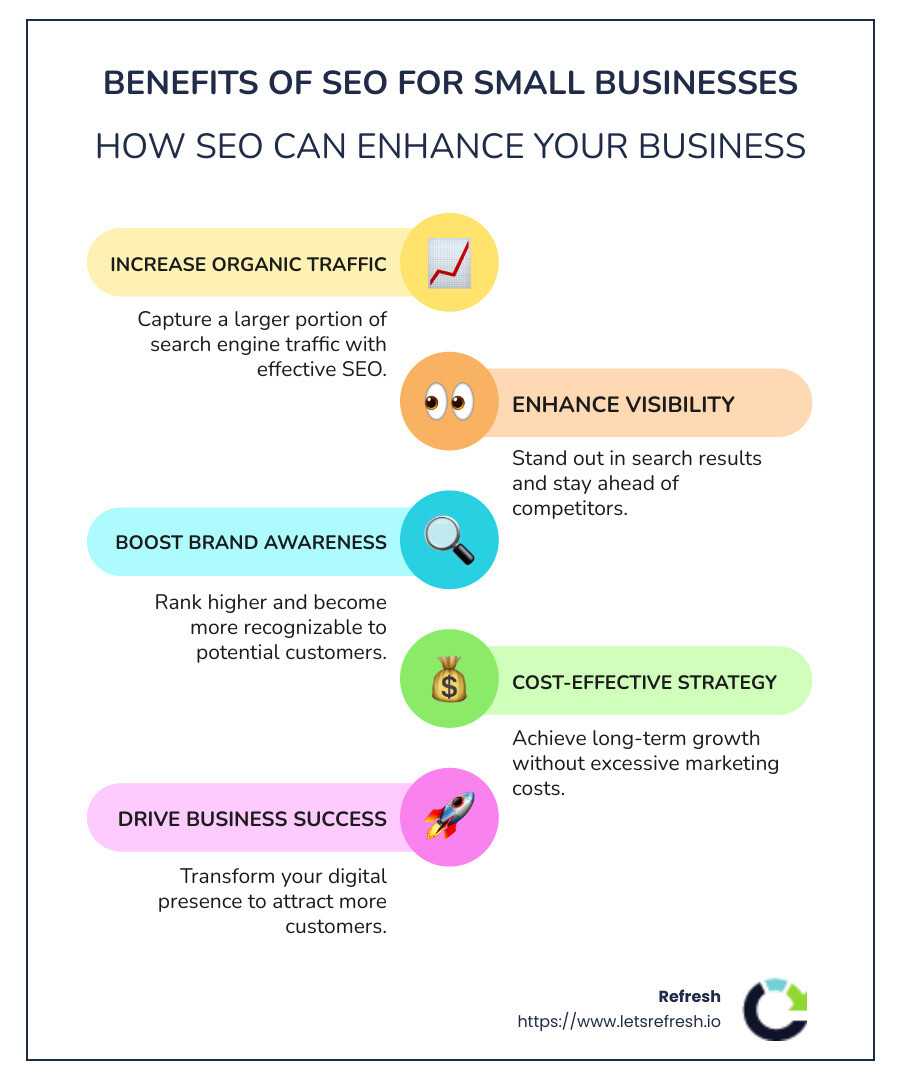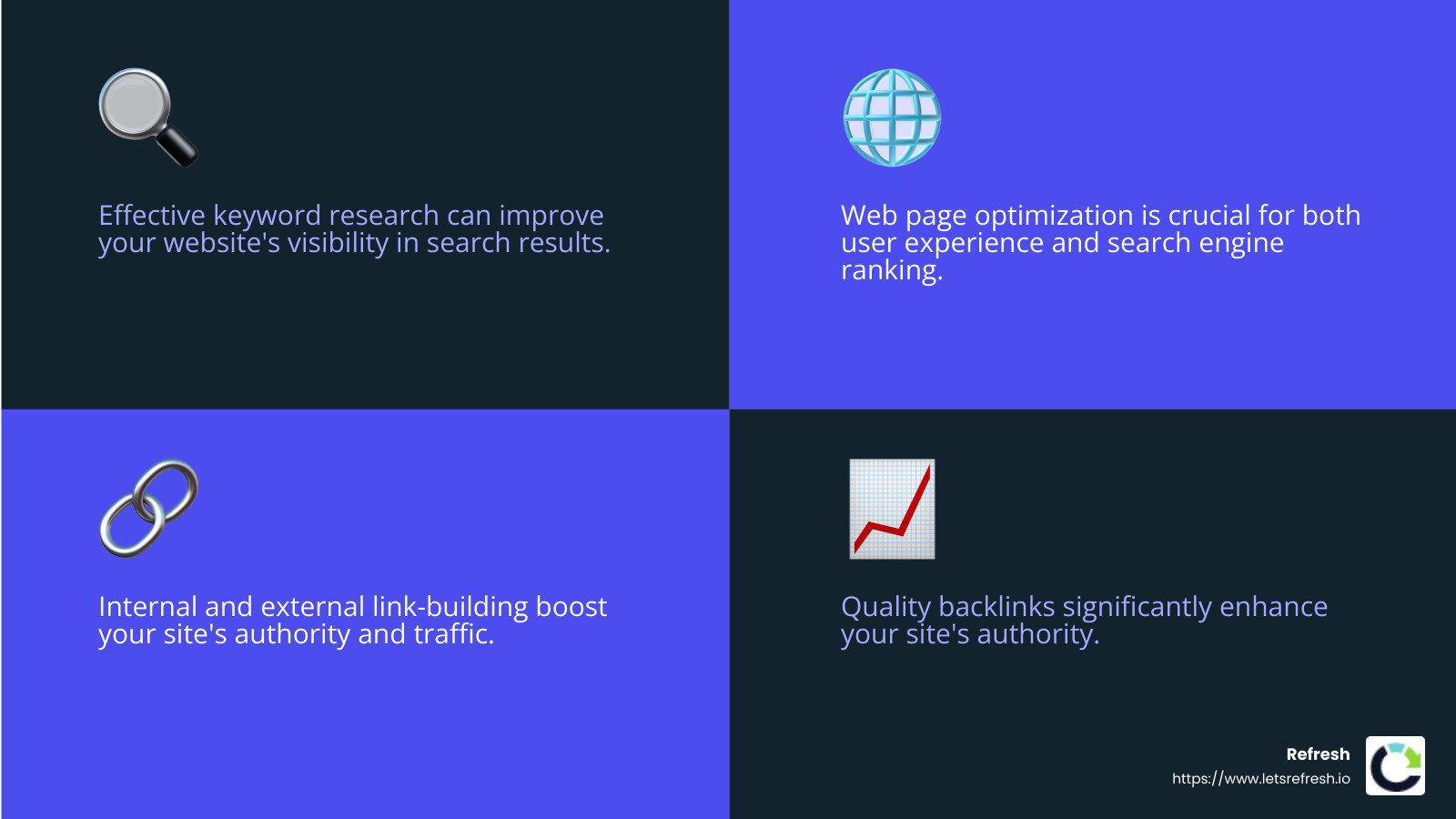July 24, 2025
If you're looking to lift your startup's digital game, mastering an seo strategy for small business is key. For a quick understanding, here's what you need to know:
- Organic Traffic: Over half of website visits originate from search engines. Strong SEO helps capture this traffic.
- Visibility: Good SEO ensures your business appears prominently in search results, keeping you ahead of competitors.
- Brand Awareness: Rank higher and stay top of mind for potential customers as they research solutions.
A well-crafted seo strategy for small business is not just about meeting today's needs—it's an investment in long-term growth and market position. By tapping into the power of search engines, businesses can boost their online visibility and attract more customers without breaking the bank.
My name is Alexander Palmiere, and as the Founder and CEO of Refresh Digital Strategy, I've helped countless small to midsized businesses succeed online with custom SEO strategies. As you move forward, we'll explore how to harness the power of an effective seo strategy for small business to transform your digital presence and drive business success.

Understanding SEO Strategy for Small Business
An effective SEO strategy for small business is all about making sure your customers can find you online. Let's break this down into three essential components: keyword research, web page optimization, and link-building.
Keyword Research
Think of keywords as the bridge between your business and potential customers. They’re the words and phrases people type into search engines when looking for products or services like yours.
To get started, use tools like Google Keyword Planner, Ahrefs, or SEMRush. These tools help identify keywords that have a good search volume and low competition. For example, a bakery in Pittsburgh might target keywords like "best cupcakes in Pittsburgh" or "custom cakes Pittsburgh."
Pro Tip: Focus on long-tail keywords. These are longer, more specific phrases that often have less competition and can lead to higher conversion rates. For instance, "gluten-free bakery in Pittsburgh" might attract more targeted traffic than just "bakery."
Web Page Optimization
Once you have your keywords, it’s time to optimize your website. This means making sure each page is set up to be easily found by search engines.
Start with page titles and headers. Include your main keyword in the title of each page and use headers to break up content and include related keywords. For example, a page about custom cakes might have a title like "Custom Cakes in Pittsburgh | Your Bakery Name" and headers like "Our Custom Cake Process" and "Why Choose Us for Custom Cakes."
Alt text for images is also crucial. It helps search engines understand the content of your images. So, if you have a picture of a wedding cake, the alt text could be "Neat wedding cake with white icing and floral design."
Link-Building
Link-building is about creating pathways that lead back to your site, boosting its authority and visibility. There are two types of links to consider:
- Internal Links: These are links between pages on your own website. They help users steer and show search engines the structure of your site. For example, linking from a blog post about icing techniques to your custom cake services page.
- External Links: These are backlinks from other websites to your site. They act as a vote of confidence in your content. To earn these, consider guest blogging, partnering with local businesses, or getting listed on local directories.
Stat:

By focusing on these three elements—keyword research, web page optimization, and link-building—you lay a strong foundation for an effective SEO strategy for small business. This approach not only improves your search rankings but also enhances your overall online presence, making it easier for potential customers to find and choose your business.
Next, we'll dive into essential SEO techniques that every small business should know, including local SEO and mobile optimization.
Essential SEO Techniques for Small Businesses
Now that we've covered the basics, let's explore some must-know techniques to lift your small business's online presence. We'll focus on local SEO, mobile optimization, and technical SEO.
Local SEO
Local SEO is crucial for small businesses that rely on customers from their surrounding area. Imagine you're a local coffee shop in Cleveland. You want people nearby to find you when they search "coffee shop near me."
Start by claiming and optimizing your Google Business Profile. This is your digital storefront and helps you appear in local search results and on Google Maps. Ensure your profile is complete with accurate NAP (Name, Address, Phone number) information, hours of operation, and engaging photos.
Stat: In 2023, 76% of people who searched for something nearby visited a business within a day. Don't miss out on these potential customers!
Next, gather customer reviews. Positive reviews not only build trust but also boost your local search ranking. Encourage satisfied customers to leave a review and respond to them promptly.
Mobile Optimization
With more people using smartphones to search the web, mobile optimization is no longer optional. It's essential.
Ensure your website is mobile-friendly by using a responsive design that adjusts to different screen sizes. A site that's easy to steer on a phone keeps visitors engaged and decreases bounce rates.
Tip: Page speed matters. Slow-loading pages can frustrate users and hurt your rankings. Use tools like Google PageSpeed Insights to identify and fix speed issues.
Technical SEO
Technical SEO involves optimizing the backend of your website to improve its visibility and performance. Here's what to focus on:
- Site Structure: Ensure your website is easy to steer. Use clear categories and a logical hierarchy. This helps search engines understand your site and index it properly.
- Fix Errors: Broken links and 404 errors can harm your rankings. Use a website crawler tool to find and fix these issues.
- Schema Markup: This is a code you add to your site to help search engines understand your content. For instance, using local business schema can improve your chances of appearing in local search results.
By implementing these essential SEO techniques, your small business can gain a competitive edge. Optimizing for local searches, ensuring mobile accessibility, and maintaining a well-structured website are key steps in building a strong online presence. Next, we'll explore top tips for small business SEO success, including how to improve content quality and user experience.
Top 5 SEO Tips for Small Business Success
Let's explore some actionable tips to boost your small business's online presence. These strategies will help you improve content quality, improve user experience, use internal linking, optimize site speed, and make the most of your Google Business Profile.
1. Content Quality
Creating high-quality content is crucial. Your content should be relevant, engaging, and provide value to your audience. Think about what your customers want to know and answer their questions. Use real-life examples and simple language to explain complex topics.
Tip: Avoid keyword stuffing. Instead, incorporate keywords naturally in your content. This helps improve your search visibility without compromising readability.
2. User Experience
A positive user experience keeps visitors on your site longer and encourages them to return. Make sure your website is easy to steer with clear menus and a logical layout. Use headers and bullet points to break up text and make it easy to scan.
Fact: According to Google, 53% of mobile users will leave a site that takes longer than three seconds to load. Keep your site fast and user-friendly to retain visitors.
3. Internal Linking
Internal links connect different pages on your website. They help users find related content and keep them engaged.
Strategy: Link to relevant blog posts or service pages within your content. This not only improves navigation but also signals to search engines that your site has valuable, interconnected content.
4. Site Speed
Site speed is a critical factor for both user experience and search rankings. Slow websites can frustrate users and lead to higher bounce rates.
Tool: Use Google PageSpeed Insights to test your site's speed and get recommendations for improvement. Compress images, minimize code, and leverage browser caching to boost performance.
5. Google Business Profile
Your Google Business Profile is a powerful tool for local visibility. Ensure your profile is complete with accurate information and eye-catching photos. This helps potential customers find you easily on Google Search and Maps.
Quick Win: Encourage happy customers to leave positive reviews on your profile. Reviews not only build trust but also improve your local search ranking.
By focusing on these five areas, your small business can stand out in search results and attract more customers. Whether it's crafting compelling content or ensuring your site loads quickly, each step contributes to a successful SEO strategy for small business.
Next, we'll explore how to implement an effective SEO strategy, including keyword targeting and content creation.
How to Implement an Effective SEO Strategy for Small Business
Implementing an effective SEO strategy for small business involves a few key steps. Let's break it down into three essential parts: keyword targeting, content creation, and analytics tracking.
Keyword Targeting
Keyword targeting is the foundation of your SEO efforts. It's about choosing the right words and phrases that your potential customers use when searching for products or services you offer.
- Identify Keywords: Use tools like Google Keyword Planner or SEMRush to find keywords relevant to your business. Look for terms with good search volume but low competition.
- Focus on Long-Tail Keywords: These are longer, more specific phrases like "best pizza in Pittsburgh" instead of just "pizza." They often have less competition and can attract more targeted traffic.
- Local Keywords: If you have a physical location, include geographic terms. For instance, "Charlotte dog grooming" will help attract local customers.
Content Creation
Creating and optimizing content is crucial for engaging your audience and improving your search rankings.
- Write for Your Audience: Create content that answers your customers' questions and solves their problems. Think blog posts, FAQs, or how-to guides.
- Incorporate Keywords Naturally: Use your targeted keywords in titles, headers, and throughout the text, but keep it natural. Avoid keyword stuffing.
- Use Visuals: Images and videos can make your content more engaging. Remember to add alt text to images to help search engines understand them.
- Update Regularly: Keep your content fresh and relevant. Regular updates can boost your SEO and keep visitors coming back.
Analytics Tracking
Tracking your progress is vital to understanding what's working and what needs improvement.
- Set Up Google Analytics: This free tool helps you see how visitors interact with your site. You can track metrics like page views, bounce rates, and conversion rates.
- Use Google Search Console: It provides insights into how your site performs in search results. You can see which queries bring traffic and identify any technical issues.
- Monitor Keyword Performance: Keep an eye on how your targeted keywords rank over time. Adjust your strategy based on what you learn.
- Evaluate ROI: Use analytics to assess the return on investment for your SEO efforts. Identify which strategies drive the most traffic and conversions.
By focusing on keyword targeting, creating valuable content, and utilizing analytics tools, your small business can build a robust online presence. These steps will help you connect with your audience and improve your visibility in search results.
Next, we'll answer some frequently asked questions about small business SEO, including how long it takes to see results and the best strategies to adopt.
Frequently Asked Questions about SEO Strategy for Small Business
How can small businesses use SEO effectively?
Small businesses can harness the power of SEO by focusing on a few key tactics. Local citations are crucial. These are mentions of your business name, address, and phone number (NAP) on other websites, like online directories. Consistency is key here. Ensure your NAP is the same everywhere to avoid confusing search engines and potential customers.
Voice search optimization is also becoming increasingly important. With more people using voice-activated devices, consider how your content can answer questions people might ask aloud. This means using more natural language and question-based keywords.
What is the best SEO strategy for small businesses?
A solid SEO strategy for small business involves building high-quality backlinks, gathering positive reviews, and ensuring your business is listed in relevant directories. Backlinks from reputable sites boost your credibility and can improve your rankings.
Encourage satisfied customers to leave positive reviews on platforms like Google and Yelp. Reviews not only build trust but also influence your search visibility. Make sure your business is listed in key directories, and keep your information up-to-date.
How long does it take to see results from SEO?
SEO is a long-term approach, and patience is essential. Typically, you might start seeing results in about six months, but significant improvements often take longer. SEO is a continual process. Regularly updating your content, tracking performance, and adjusting strategies based on data are crucial for sustained success.
By focusing on these strategies, small businesses can effectively use SEO to improve their online presence and reach more customers.
Conclusion
At Refresh, we understand that navigating the digital landscape can be daunting for small businesses. That's why we specialize in crafting custom digital marketing strategies that focus on long-term growth and success. Our approach is not just about quick wins; it’s about building sustainable and meaningful partnerships that evolve with your business.
Digital marketing is a powerful tool that can lift your business from small to mighty. It encompasses a range of strategies, from SEO to social media management, each playing a vital role in increasing your online visibility and attracting potential customers. By leveraging these tools, you can create a robust online presence that stands out in today's competitive market.
Our commitment to long-term partnerships means we are with you every step of the way, offering expert guidance and support. We believe in understanding your unique business needs and goals, and then designing a strategy that aligns with them. This personalized approach ensures that your business not only grows but thrives in the digital world.
If you're ready to take your business to the next level with a comprehensive digital marketing strategy, we're here to help. Find more about our services and how we can support your growth journey.
In conclusion, investing in a strategic SEO plan is crucial for small businesses aiming to expand their reach and impact. With the right guidance and a focus on long-term success, you can transform your business into a powerful online presence. Let Refresh be your partner in this exciting journey.
Still have questions? Let’s talk about it.
.avif)





